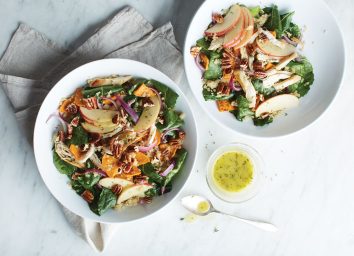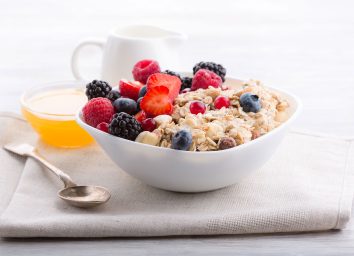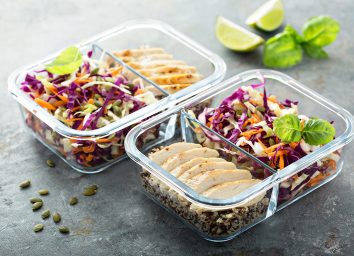What Happens to Your Body When You Skip Lunch, Says Nutritionist
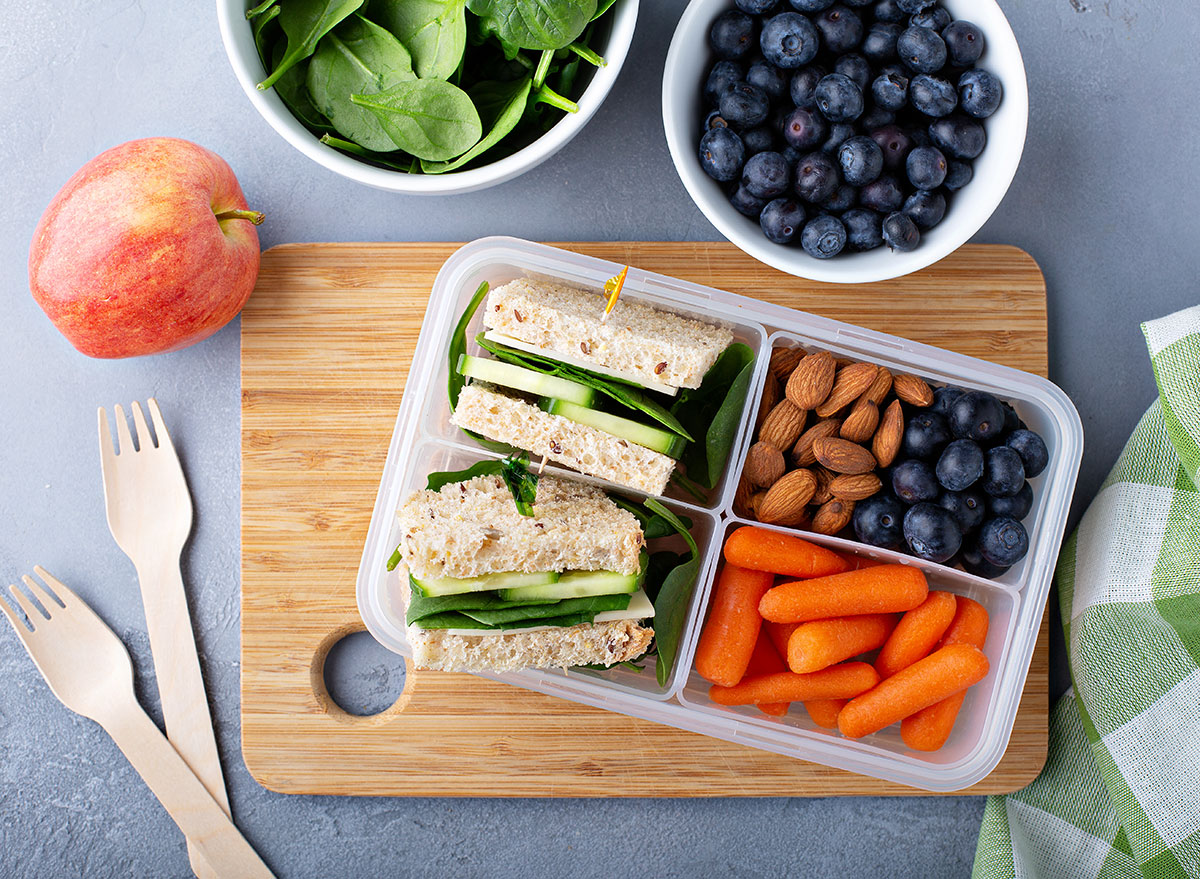
Starting your day with a hearty breakfast and making dinner plans tend to be on most people's daily to-do list. But then there is lunch. The often forgotten meal of the day that some might even just skip completely. It's happened to the best of us where snacking between breakfast and dinner ends up being the case.
But skipping lunch isn't ideal.
"Lunch is a key component of our diets making up one-third or more of our daily food intake, and it's the meal powering us through the majority of our workday," says ETNT medical board expert, Dr. Brooke Scheller, DCN, CNS. "Unfortunately, with the trend of 'sad desk lunch,' we joke about brown-bagged meals like leftovers that we tote in Tupperware, a boring sandwich, or even something that we pick up to-go (hello $16 salads). But even worse is that we bring them to sit right back at our desks to keep working. Not recognizing the importance of pausing for lunch can sabotage your afternoon productivity and even be the cause of evening overindulgence or stress eating later in the day."
For those who are lucky enough to have a job where they were able to pivot from working in an office to working from home during the pandemic, practicing healthy lunch habits wasn't at the top of the priority list.
"Working from home creates a new challenge in our schedules. What once felt routine—waking up at the same time, commuting to work, scheduled breaks, etc. is now replaced by increased time behind the screen and less structure around our day and our meals," Dr. Scheller explains. "Freshly surveyed 2,000 Americans in August 2020 about how their productivity concerns and eating habits have evolved while working from home during the pandemic. Bottom line, [working from home] isn't as glamorous as perceived—and while people want to eat healthier, nutrition often takes a backseat these days."
So what exactly happens when you skip lunch? And how can you break these habits? Read on to uncover Dr. Scheller's insight, and to give you some ideas about which foods you should be adding to your diet, check out The 7 Healthiest Foods to Eat Right Now.
Your afternoon productivity levels drop.
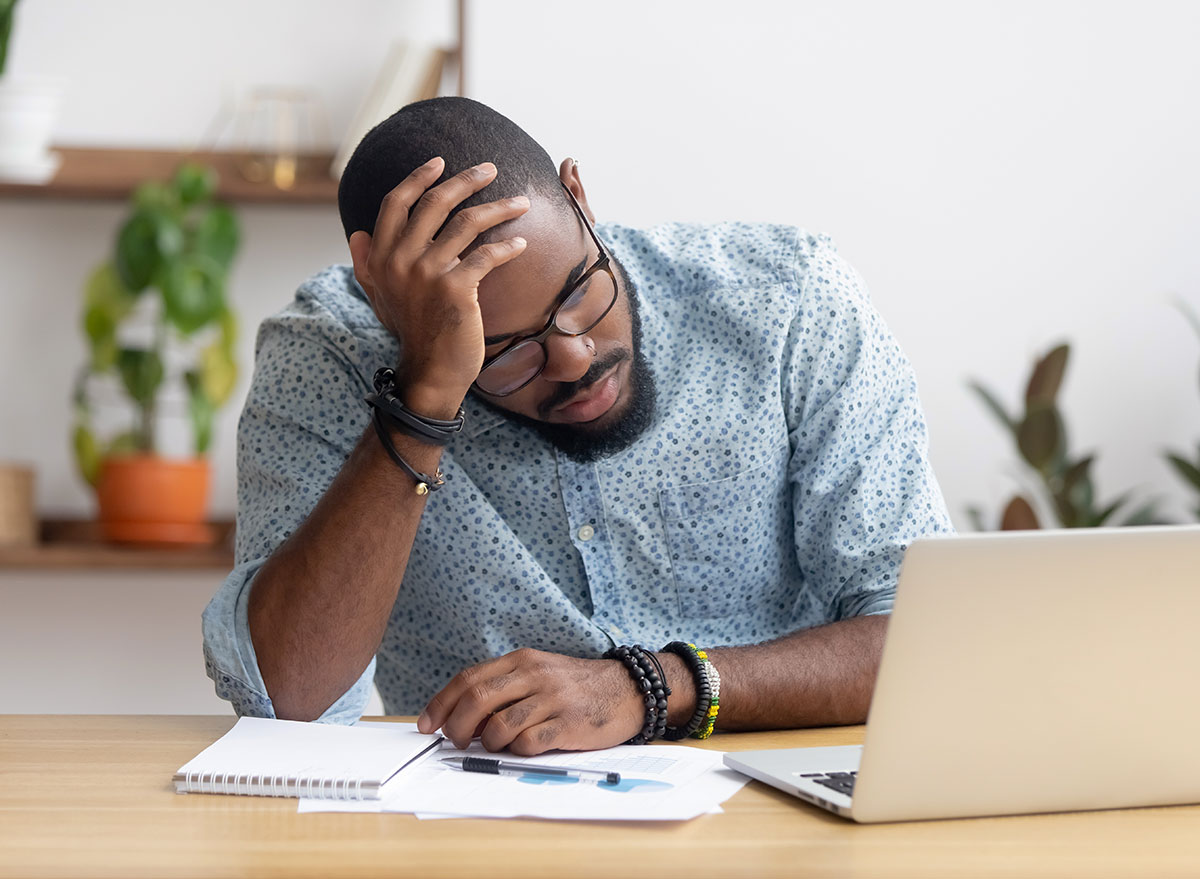
"While lunch often is downplayed by the idea that it needs to be quick, rushed, and jammed into our day, fuel eaten at lunchtime is extremely important for setting us up for a productive afternoon and relaxed evening," Dr. Scheller says, "Have you ever experienced that 2 p.m. feeling? Yawns, energy crash, and cravings for you next pick me up? (Think: coffee, chips, candy.) This feeling is directly related to what you have consumed for lunch."
If you're not fueling yourself properly at lunch, you could be facing a major slump in the afternoon in which you're not able to focus on your work.
"There are several important things to take into account when it comes to nutrition and productivity or focus. While the two don't necessarily seem connected, what you've eaten for breakfast, lunch, and snacks throughout the day plays a huge role in your ability to focus and concentrate during the day," Dr. Scheller adds.
You could overindulge later.
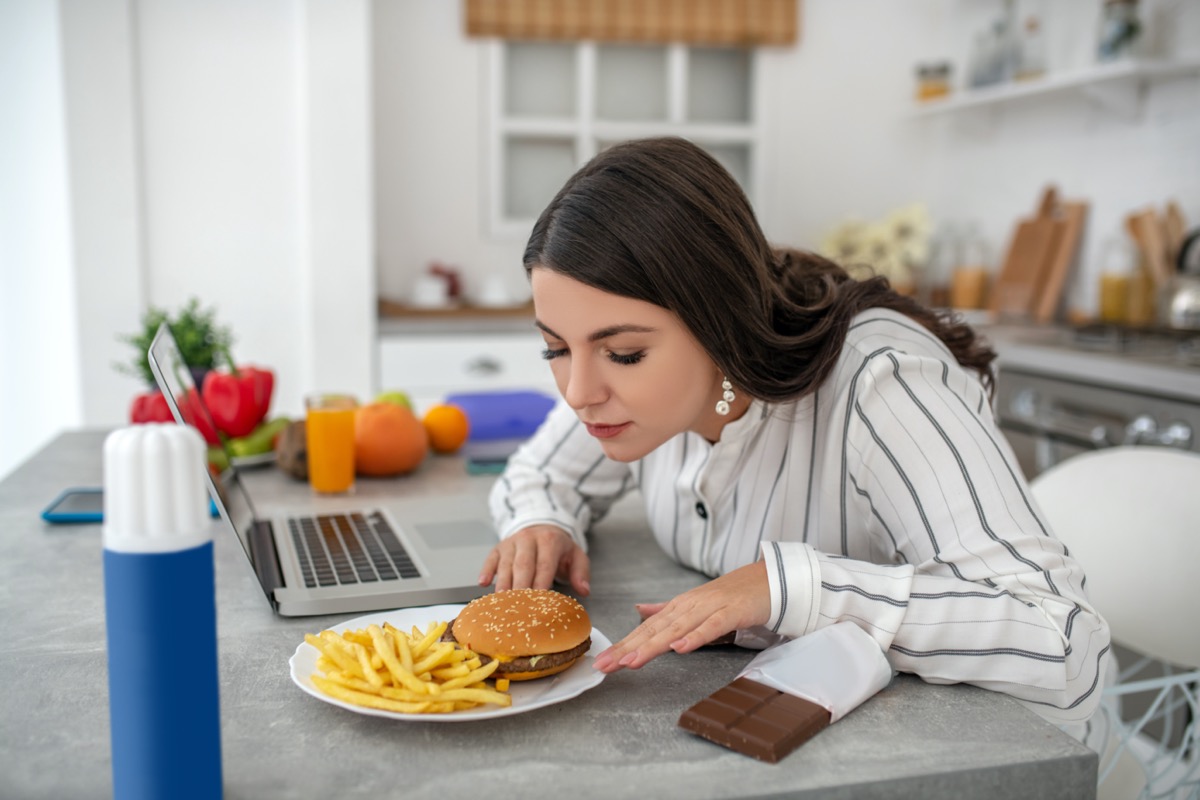
Simply put: If you skip lunch, you could get into more trouble later in the evening.
"If we don't eat enough throughout the day, we tend to make up for it later in the day by overdoing it on evening snacks, and there's a biochemical reason as to why this happens," Dr. Scheller says. "Focus on your meals throughout the day and you'll be less likely to overindulge at night."
Your blood sugar can be affected.

You might notice that when you skip lunch, you eventually turn to less than stellar options when you get around to looking for something to eat. And this can lead to your blood sugar to be all over the map.
"When we consume high sugar and high carbohydrate foods, we tend to experience fluctuations in blood sugar that can cause fatigue, lack of focus, and cause us to be hungry (or crave more sweet, carb-rich foods)," Dr. Scheller says. "Low blood glucose also reduces our self-control, making it harder to say no to those more indulgent foods."
You can avoid this from happening, as long as you're eating the right foods.
"To combat this, it is ideal to focus on having a source of protein and/or healthy fats with every meal and snack," Dr. Scheller recommends. "This means paring your fruit with some nuts, cheese, avocado, or other protein-rich food. Or including fish, chicken, or even beans with lunch. This helps to taper our body's blood sugar response, keeping us full and focused for longer."
While you want to make sure you're eating a nutritious lunch to keep you focused and your blood sugar levels stable, there is nothing wrong with snacking when hunger hits. Again, as long as you're making the right choices!
"My general rule of thumb is that you should be eating every 3-4 hours to maintain blood sugar levels. That means that for some, a small afternoon snack may be helpful to stave off decreases in energy and productivity to get through the afternoon," Dr. Scheller says. "Snacks should always be focused on incorporating proteins and healthy fats to stabilize energy. Consuming sweets and high carb will likely cause a crash later on in the day."
Looking for more helpful tips? Sign up for our newsletter to get daily recipes and food news in your inbox!
You might be missing out on key nutrients.
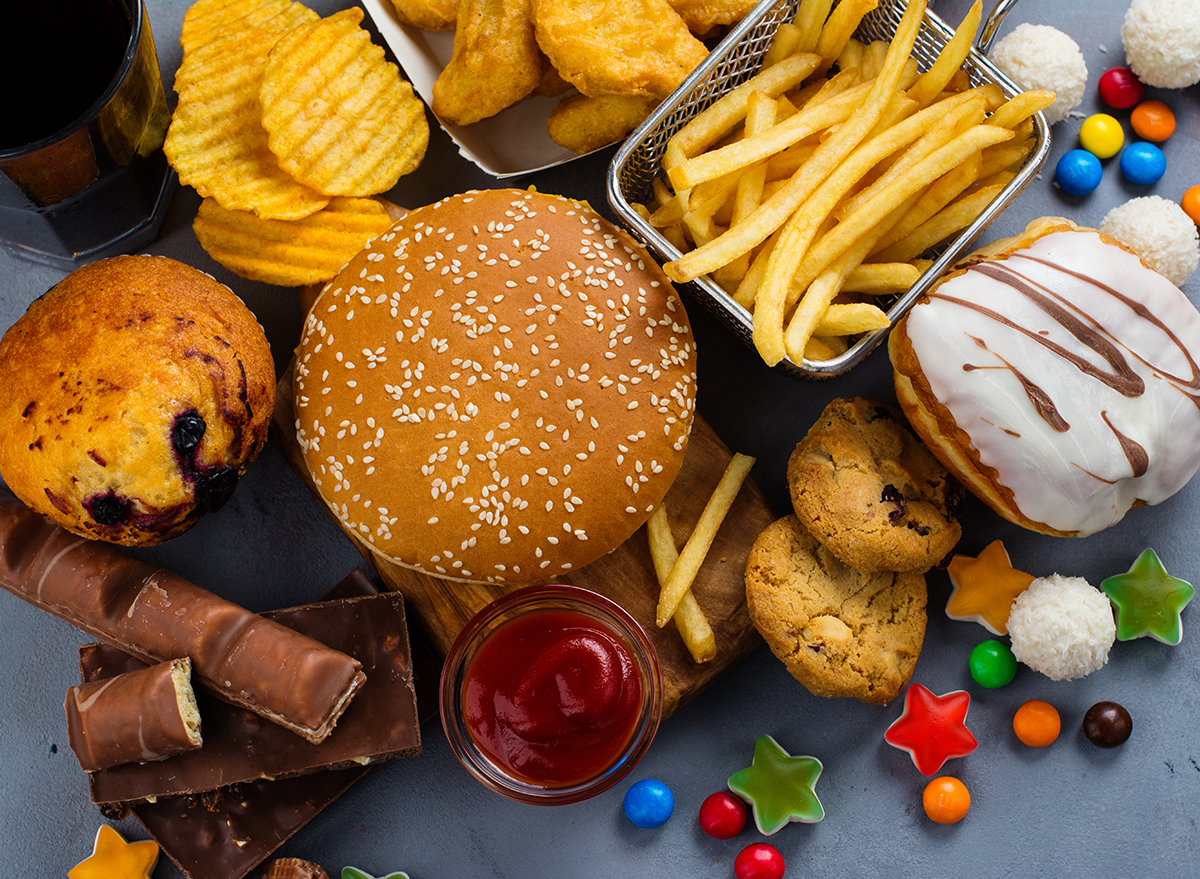
By now, it's clear that when you skip lunch, there's a good chance you're likely going to end up choosing the wrong foods later in the day. Even if you think you're too busy working to take the time to make yourself a solid lunch, this can be detrimental.
"According to a study published in the American Journal of Health Behavior, long and irregular work hours were studied as one of the main barriers to healthy eating. Unsurprisingly, those who worked longer hours found that they were more likely to eat on the go, being too rushed to sit down and eat a meal, and with lower consumption of nutrient-dense foods like fruits and vegetables," Dr. Scheller says. "Many nutrients are critical for proper brain function and energy levels. B vitamins, like those found in many of our fruits and vegetables, dairy, and protein sources, are critical for our energy production systems. Other nutrients, like omega-3 fatty acids, vitamin C, and vitamin D can be important for proper brain function and are important to gain through the diet."
What should you actually eat for lunch?
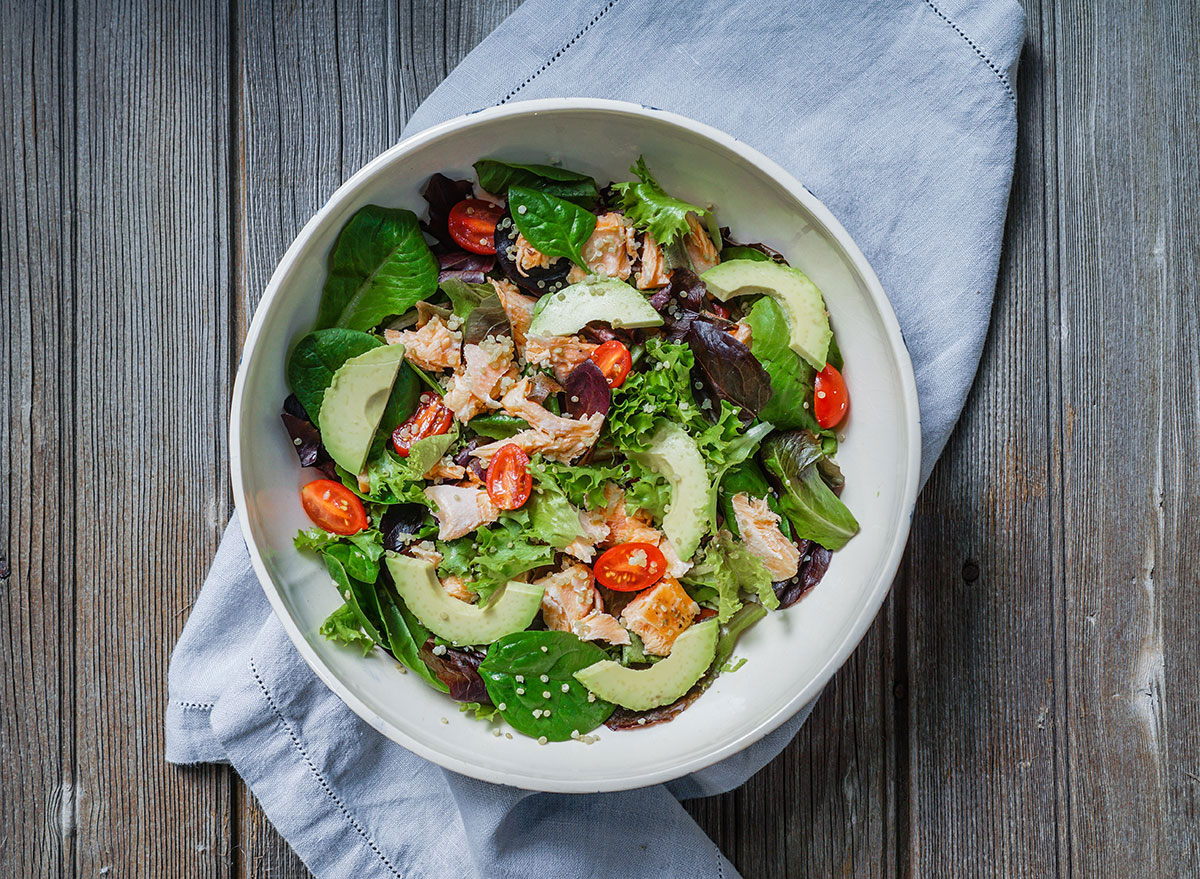
Now that you're aware of why you shouldn't skip lunch, you might be wondering what are the best foods to eat.
"The best lunch is made up of a few different components: protein, healthy fats, fiber, and vegetables," Dr. Scheller explains. "Think a helping of roasted veggies with chicken breast and avocado, a big salad with leafy greens, salmon, and olive oil dressing, or a bowl made with fiber-rich grains, veggies, and chicken."
In need of some meal ideas? Dr. Scheller has some easy options so you can start your healthy lunch journey.
- Prepared meals: "Meals like those from Freshly can help support the at-home workforce with a grab-and-go option that you can eat at your desk," she says. "With most meals focusing on high-protein ingredients and a generous serving of veggies and plant-forward foods, all within a controlled portion, this is a great solution for a healthy on-the-go lunch without the prep work. Meals are fresh (never frozen) and all you need is a microwave and fork to get lunch ready in 3 minutes."
- One-pan lunches: "I am a big fan of a 'set it and forget it' method, like the Crock Pot. But a sheet pan lunch can be a great way to get your fill of protein and veggies without having to stand over the stovetop," she suggests. "Preheat the oven to 400 degrees and fill a pan with chicken breast or fish and an array of veggies (I like to do sweet potatoes and brussels sprouts), toss with olive oil and spices, and roast for about 30 minutes. Set this up before you take your break for lunch so you've got time to grab an outdoor walk before heading back to the computer."
- Chopped salad: "Chop everything in advance the night before or over the weekend, so you can just toss together, add protein, and top with dressing," she says. "Alternatively, you can buy pre-chopped salad mixes at the grocery store to save more time. My favorite is a quick homemade dressing of olive oil, apple cider vinegar, a hint of dijon mustard, salt, and pepper."
What should you do to make sure you don't skip lunch again?
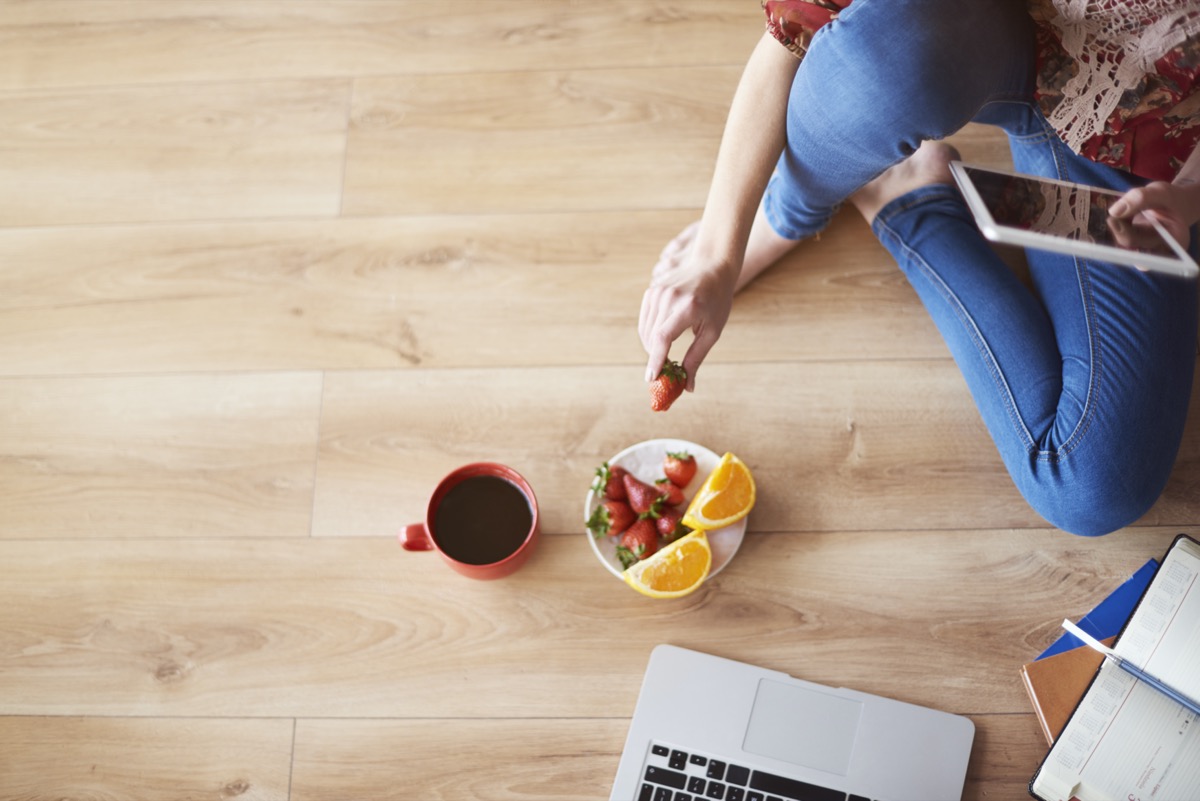
All you have to do is some minor planning! Taking a break from your work for a bit to stretch your legs and eat a proper lunch is overall good for your health. It's much easier than you may think to avoid skipping lunch, according to Dr. Scheller's suggestions.
- Schedule breaks: "Block off a lunch hour (or at least 30 minutes) on your work calendar every day. Without this, you can often end up with a day full of back-to-back meetings that simply leaves you with zero time for a lunch break," she says. "Even if it's simply moving to your kitchen or dining room table, sitting outside, something to take you out of your work zone that forces you to disconnect and take a break."
- Have a game plan: "Whether this is having meals prepared ahead of time that is ready to eat, or have meals that are quick and easy to assemble this will leave you with no excuses for skipping lunch," she says. "The less time you spend prepping during your lunch break itself, the more time you'll have for yourself. I recommend using any extra time to take an outdoor walk, do a quick online workout, or even perform a meditation. Exposure to the outdoors increases positivity and improves well-being and even can increase job satisfaction."
